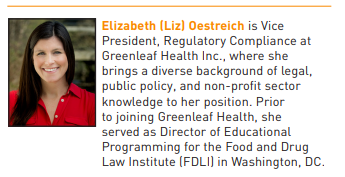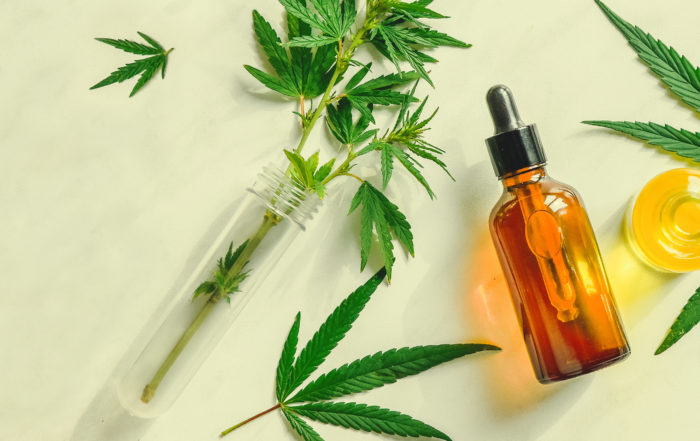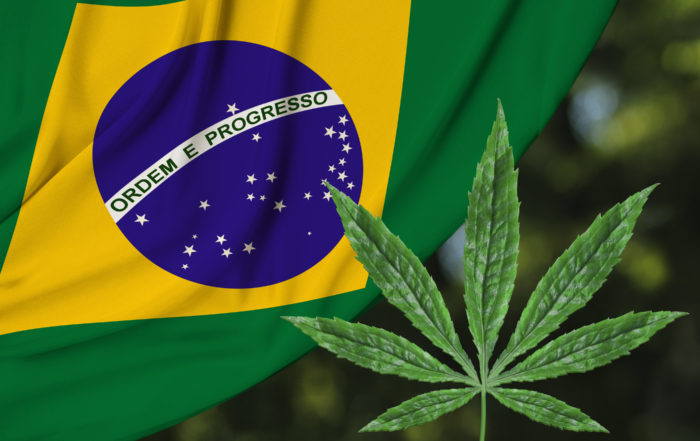
CBD Enforcement – Who is Keeping Watch?
By Elizabeth Oestreich
 Cannabidiol (CBD) products are now available everywhere from your local coffee shop to the corner pharmacy. Over the summer of 2019, the emergence of a wide variety of cannabinoid containing products, including foods, beverages, cosmetics, and products that the Food and Drug Administration (“FDA” or the “agency”) would classify as drugs expanded their foothold in North America. Despite various statutory barriers, menus all over the country have seemingly started offering to “add CBD oil to any order.”
Cannabidiol (CBD) products are now available everywhere from your local coffee shop to the corner pharmacy. Over the summer of 2019, the emergence of a wide variety of cannabinoid containing products, including foods, beverages, cosmetics, and products that the Food and Drug Administration (“FDA” or the “agency”) would classify as drugs expanded their foothold in North America. Despite various statutory barriers, menus all over the country have seemingly started offering to “add CBD oil to any order.”
This article will explore how CBD is currently regulated, the roles of the FDA and the Federal Trade Commission (FTC), and enforcement actions thus far for this popular substance.
Background
The Agriculture Improvement Act of 2018 (The “Farm Bill”) removed hemp and hemp derived substances from the list of list of Schedule I drugs under the Controlled Substances Act (CSA) making CBD derived from hemp containing less than 0.3% tetrahydrocannabinol (THC), legal to grow and consume in the United States.[1] Hemp was removed from the list of Schedule I drugs, but marijuana was not. Therefore, CBD derived from hemp is legal as long as it contains less than 0.3% THC, while CBD derived from marijuana remains an illegal Schedule I drug. The day the Farm Bill was signed, the former commissioner of the FDA, Scott Gottlieb, explained that despite the new legal status of hemp, “Congress explicitly preserved the agency’s current authority to regulate products containing cannabis or cannabis-derived compounds under the Federal Food, Drug, and Cosmetic Act (FD&C Act) and Section 351 of the Public Health Service Act.”[2] Fast forward one year and there have been few enforcement action to deter companies from flooding the market with CBD products of varying quality, in various forms, and containing a variety of drug claims.
The FD&CA defines a drug as an article intended for use in the diagnosis, cure, mitigation, treatment, or prevention of disease in man or other animals and articles (other than food) intended to affect the structure or function of the body.[3]
Any product making a drug claim is categorized as a drug under section 201(g)(1)(B) of the FD&CA, and is thus on the market unlawfully unless that drug has preapproval from the agency. Dietary supplements and foods containing CBD are also on the market unlawfully. The agency has explained that, per section 301(ll) of the FD&CA, “it is a prohibited act to introduce or deliver for introduction into interstate commerce any food (including any animal food or feed) to which THC or CBD has been added.”[4] The agency has also explained that because CBD is an ingredient in an approved drug product, (i.e., Epidiolex), it may not be marketed as a dietary supplement. The exception to this definition under section 201(ff)(3)(B)(i) and (ii) for products that were marketed as a dietary supplement or conventional food prior to the authorization of a new drug investigation does not apply for CBD products.
Since December 2018, there have been a total of twenty two warning letters issued by FDA to enforce their authority in this area.[5] So far, FDA’s enforcement priorities have focused on egregious drug claims, specifically those products claiming to treat or cure serious diseases like cancer, Alzheimer’s, Parkinson’s, and Huntington’s disease, among others. Of these enforcement actions, four have been issued jointly with the FTC.[6] Three warning letters were also issued independently by FTC.[7]
In its warning letters, FDA has outlined the drug claims made by a variety of CBD containing products. In the four warning letters issued jointly by FDA and FTC to Advanced Spine and Pain, LLC, Nutra Pure LLC, PotNetwork Holdings, Inc. and Rooted Apothecary LLC, FDA focused on the drug claims found on each company’s website and highlighted their product’s status as a new drug which was unapproved and introduced to the market without prior approval from the FDA, as required by section 301(d) and 505(a) of the FD&CA.[8] The Advanced Spine and Pain, LLC and Curaleaf warning letters also included warnings for unapproved new animal drugs.[9] In each letter, FDA lists new animal drug products marketed by each company and associated claims for the diagnosis, cure, mitigation, treatment or prevention diseases. FDA also warned companies that CBD containing products cannot be marketed as dietary supplements per section 201(ff)(3)(B)(i).
The most recent jointly issued warning letter by FDA and FTC cited claims that Rooted Apothecary’s CBD products were intended to treat teething pain and or ear aches in infants or children.
On March 28, 2019, Scott Gottlieb, who at the time was the FDA Commissioner, publicly stated within a Senate Appropriations Subcommittee hearing that the agency was exercising enforcement discretion for CBD products, and that the agency will conduct enforcement efforts focused on the most egregious products first – namely, those products that make outrageous drug claims about the treatment, cure or mitigation of a disease.[10] The agency has expressed concern that these claims may lead a patient in need to use a CBD product rather than an approved FDA drug product that has proven safety and efficacy. Shortly after Gottlieb’s departure from FDA in April 2019, Steve Tave, Director of the Office of Dietary Supplement Programs contradicted the former Commissioner to clarify that the agency was not using enforcement discretion for CBD products but reiterated the policy of prioritizing enforcement of products that claim to prevent, diagnose, treat or cure serious diseases first.[11]
FTC Enforcement
As separate agencies, FTC and FDA work independently, but often coordinate enforcement efforts in areas of common interest. The popularity of this product category has caused both FTC and FDA to act, jointly and unilaterally.
In the four letters FTC issued jointly with FDA, FTC warned that the company’s advertisements were not supported by competent and reliable scientific evidence. For example, the letter FDA and FTC jointly issued to Advanced Spine and Pain noted that, “it is unlawful under the FTC Act, 15 U.S.C. § 41 et seq., to advertise that a product can prevent, treat, or cure human disease unless you possess competent and reliable scientific evidence, including, when appropriate, well-controlled human clinical studies, substantiating that the claims are true at the time they are made.[12] The letter supported the decision in POM Wonderful LLC v. FTC, 777 F.3d 478, 504-05 (D.C. Cir. 2015) and other cases.
Of note, beyond the four warning letters issued jointly with FDA, FTC independently issued warning letters to three companies that sell oils, tinctures, capsules, “gummies,” and creams containing CBD.[13] The three companies have been identified as 4Bush Holdings, LLC, NuLife LLC, and Ocanna Co. In a press release on September 10, 2019 announcing the three warning letters, FTC stated it “urges the companies to review all claims made for their products, including consumer testimonials, to ensure they are supported by competent and reliable scientific evidence.”[14] Interestingly, there was no mention of FDA joining FTC in issuing a joint letter to these companies, nor did FDA make a statement surrounding the letters.
The information on which FTC bases its action as detailed in the press release includes a company’s website claims for a CBD products that “works like magic” to relieve “even the most agonizing pain” better than prescription opioid painkillers.[15] These letters warn that it’s illegal to advertise that a product can prevent, treat, or cure disease without competent and reliable scientific evidence to support such claims. Because these products are making drug claims, FDA could have joined FTC in issuing warning letters, but seemingly chose not to do so.
FDA and FTC enforcement tools differ greatly as do the respective missions of the agencies. FTC’s stated mission includes protecting consumers from unfair trade practices, so it focuses on the claims and marketing practices surrounding a product.[16] FTC has the ability to issue monetary fines to companies who falsely advertise unproven medical claims. On the other hand, FDA’s mission includes protecting the public health by ensuring the safety and efficacy of medical products. FDA’s mission also includes removing unapproved products from the market where necessary.[17]
The solo action by FTC is noteworthy because FTC and FDA frequently work in tandem when they have overlapping jurisdiction, by issuing a joint letter with specific mentions of each agency’s respective areas of “primary responsibility.” Specifically, “the FTC and FDA have overlapping jurisdiction with respect to the advertising, labeling, and promotion of foods, over-the-counter drugs, cosmetics and medical devices.” Under a long-standing liaison agreement between the agencies, the FDA exercises primary responsibility for regulating the labeling of these products, while the FTC has primary responsibility for enforcing laws against false or misleading advertising of these products.”[18]
In 1971 FDA and FTC executed a Memorandum of Understanding (MOU), which stated that the FTC “[w]ith the exception of prescription drugs . . . has primary responsibility with respect to the regulation of the truth or falsity of all advertising (other than labeling) of . . . drugs” and “will exercise primary jurisdiction over the truth or falsity of advertising of . . . drugs (with the exception of prescription drugs) . . .”.[19] The FDA “has primary responsibility with respect to the regulation of the truth or falsity of prescription drug advertising” and “will exercise primary jurisdiction over all matters regulating the labeling of . . . drugs . . .”.[20] FDA has stated that information available on a company’s website may constitute labeling.[21] To support this statement, the agency referenced the court’s decision in Kordel v. United States wherein it was held that labeling is something that supplements or explains an article, and does not need to be physically attached to the article to be designated as a label.[22] FDA has stated that information disseminated on the internet by or on behalf of a regulated company can meet the definition of labeling in section 201(m) of the FD&CA.
In the jointly issued warning letters, FTC stated it is unlawful under 15 USC section 41, to make unsubstantiated advertising claims, specifically advertising that a product can prevent, treat, or cure human disease unless the advertiser possesses competent and reliable scientific evidence substantiating that the claims are true at the time they are made.[23] The joint warning letter language also notes that “to make or exaggerate such claims, whether directly or indirectly, through the use of a product name, website name, metatags, or other means, without rigorous scientific evidence sufficient to substantiate the claims, violates the FTC Act.”[24] Based on this, FTC has been actively enforcing against claims that do not provide reliable substantiation scientific evidence. These claims, all egregious, were those that were pulled directly from the company’s website, not third party websites or other mediums of typical advertising. According to the MOU, liaison officers from each agency should have been corresponding to share information on proposed proceedings and developments in areas of joint concern, which includes CBD. It is unclear if that happened in the September 2019 warning letters issued independently by FTC.[25]
The most recent jointly issued warning letter was issued to Rooted Apothecary in October 2019. In November 2019, FDA independently issued 15 more warning letters. FDA’s most recent letters focus mainly on “companies that violate the law in ways that raise a variety of public health concerns.”[26] At FDLI’s Enforcement, Litigation and Compliance Conference in Washington, DC on December 12, 2019, Richard Cleland, Assistant Director, Bureau of Consumer Protection, Division of Advertising Practices, FTC, explained that “even though we (FTC) didn’t join those warning letters (issued by FDA) we are very carefully monitoring the companies to which those warning letters were sent.”
Mr. Cleland added that FTC is moving past the warning letter phase and into the enforcement phase. With the uptick in CBD products on the market, it is likely that we will continue to see action, whether in solo or joint from both the FDA and FTC as they attempt to curb claims that are unsubstantiated and egregious.
Congressional Pressure
Congress has also noticed the boom of CBD products on the market and has turned to FDA for regulation. Members of both parties have been vocal about the need for regulation. Recently, on September 19, 2019 Senate Majority Leader Mitch McConnell (R-KY) proposed language within the FY 2020 spending bill for FDA which would require FDA to establish an enforcement policy on CBD.[27] Members of the House of Representatives sent similar remarks to FDA’s Commissioner in a letter on September 19th encouraging the agency to adopt an interim final rule to regulate CBD as a food additive and dietary supplement.[28] The US Senate has seen strong bipartisan support for this issue as well. The general message from both houses has been to urge FDA to create a regulatory framework for CBD products, and to do so quickly. Some members of congress have also asked FDA to issue an enforcement discretion policy which would allow “compliant” products on the market pending a final rule. Since passage of the Farm Bill, Congress and FDA have looked to one another for action, however development of regulation is an arduous process and statutory provisions have prevented FDA from issuing guidance.[29] When pressured, FDA points to the “many unanswered questions about the science, safety, and quality of products containing CBD.”[30] On November 1, 2019 Dr. Stephen Hahn was nominated as the Commissioner of Food and Drugs at the Department of Health and Human Services. Dr. Hahn was confirmed as Commissioner on December 12, 2019. It will be interesting to see how the new Commissioner prioritizes the regulation of CBD and enforcement of this booming industry.
FDA Enforcement Discretion
FDA has indicated that it may take years to develop and issue regulation for hemp derived products, including CBD. Developing a regulatory framework for this diverse sector of products, or any product category for that matter, is a complicated and time consuming undertaking. Many have speculated that FDA may announce enforcement discretion for CBD products in the interim in order to allow these increasingly popular products that meet specific conditions to stay on the market. For example, some in industry are hoping that the agency will issue enforcement discretion for a limited time for all products containing a certain amount of CBD as long as the product is manufactured under certain parameters to ensure quality, and do not make drug claims.
State Activity
Can FDA rely on the states to adequately enforce against unlawful CBD products? While the states have their own enforcement programs, as the regulating agency FDA is much more capable of consistent enforcement across the board. State enforcement, for the most part, consists of a patchwork of regulations that are inconsistent across the country and enforcement is generally under-funded and minimally effective. The varying legality of hemp and marijuana products across the country also means that various states will enforce their laws differently. While states have a strong interest in protecting their citizens, it is challenging for them to establish standards for products that are distributed nationally. Thus, federal enforcement is likely to be the most effective in curbing the proliferation of unlawful CBD products.
Conclusion
Given the growing presence of CBD products on the market, it is clear that FDA and FTC will continue with their respective enforcement efforts, whether through solo or joint actions. Given the political pressure on FDA, is FTC the more appropriate agency to step up its enforcement efforts while FDA prepares to launch a regulatory framework that might include enforcement discretion for certain types of products containing CBD? Industry is hopeful that these questions will soon be answered so that CBD enforcement and regulation can begin to take shape and a clear path towards product approval is revealed.
[1] The Agriculture Improvement Act of 2018, available at https://www.congress.gov/115/bills/hr2/BILLS-115hr2enr.pdf
[2] Statement from FDA Commissioner Scott Gottlieb, M.D., on signing of the Agriculture Improvement Act and the agency’s regulation of products containing cannabis and cannabis-derived compounds, December 20 2018, available at https://www.fda.gov/news-events/press-announcements/statement-fda-commissioner-scott-gottlieb-md-signing-agriculture-improvement-act-and-agencys
[3] US Code § 321(g)(1), “The term “drug” means (A) articles recognized in the official United States Pharmacopoeia, official Homoeopathic Pharmacopoeia of the United States, or official National Formulary, or any supplement to any of them; and (B) articles intended for use in the diagnosis, cure, mitigation, treatment, or prevention of disease in man or other animals; and (C) articles (other than food) intended to affect the structure or any function of the body of man or other animals; and (D) articles intended for use as a component of any article specified in clause (A), (B), or (C).”
[4] FDA Regulation of Cannabis and Cannabis-derived Products, Including Cannabidiol (CBD), available at https://www.fda.gov/news-events/public-health-focus/fda-regulation-cannabis-and-cannabis-derived-products-including-cannabidiol-cbd#farmbill
[5] Warning Letters and Test Results for Cannabidiol-Related Products, FDA, available at https://www.fda.gov/news-events/public-health-focus/warning-letters-and-test-results-cannabidiol-related-products
[6] FDA-FTC jointly issued warning letters, FDA Warning Letter, Advanced Spine and Pain, LLC, March 28, 2019, available at https://www.fda.gov/inspections-compliance-enforcement-and-criminal-investigations/warning-letters/advanced-spine-and-pain-llc-565256-03282019; FDA Warning Letter, Nutra Pure LLC, March 28, 2018, available at https://www.fda.gov/inspections-compliance-enforcement-and-criminal-investigations/warning-letters/nutra-pure-llc-567714-03282019; FDA Warning Letter, PotNetwork Holdings, Inc., March 28, 2019, available at https://www.fda.gov/inspections-compliance-enforcement-and-criminal-investigations/warning-letters/potnetwork-holdings-inc-564030-03282019; FDA Warning Letter, Rooted Apothecary LLC, October 10, 2019, available at https://www.fda.gov/inspections-compliance-enforcement-and-criminal-investigations/warning-letters/rooted-apothecary-llc-585312-10102019
[7] FTC warning letter, 4Bush Holdings, LLC , issued September 9, 2019, available at https://www.ftc.gov/system/files/documents/foia_requests/foia-2019-01289_warning_letters_sent_to_cbd_companies_9-30-19.pdf; FTC warning letter, NuLife LLC , issued September 9, 2019, available at https://www.ftc.gov/system/files/documents/foia_requests/foia-2019-01289_warning_letters_sent_to_cbd_companies_9-30-19.pdf; FTC warning letter, Ocanna Co., issued September 9, 2019, available at https://www.ftc.gov/system/files/documents/foia_requests/foia-2019-01289_warning_letters_sent_to_cbd_companies_9-30-19.pdf
[8] FDA Warning Letter, Advanced Spine and Pain, LLC, March 28, 2019, available at https://www.fda.gov/inspections-compliance-enforcement-and-criminal-investigations/warning-letters/advanced-spine-and-pain-llc-565256-03282019; FDA Warning Letter, Nutra Pure LLC, March 28, 2018, available at https://www.fda.gov/inspections-compliance-enforcement-and-criminal-investigations/warning-letters/nutra-pure-llc-567714-03282019; FDA Warning Letter, PotNetwork Holdings, Inc., March 28, 2019, available at https://www.fda.gov/inspections-compliance-enforcement-and-criminal-investigations/warning-letters/potnetwork-holdings-inc-564030-03282019; FDA Warning Letter, Rooted Apothecary LLC, October 10, 2019, available at https://www.fda.gov/inspections-compliance-enforcement-and-criminal-investigations/warning-letters/rooted-apothecary-llc-585312-10102019
[9] FDA Warning Letter, Curaleaf, Inc., July 22, 2019, available at https://www.fda.gov/inspections-compliance-enforcement-and-criminal-investigations/warning-letters/curaleaf-inc-579289-07222019
FDA Warning Letter, Advanced Spine and Pain, LLC, March 28, 2019, available at https://www.fda.gov/inspections-compliance-enforcement-and-criminal-investigations/warning-letters/advanced-spine-and-pain-llc-565256-03282019
[10] Review of the FY 2020 Budget Request for the FDA, Subcommittee Hearing, US Senate Committee on Appropriations, available at https://www.appropriations.senate.gov/hearings/review-of-the-fy2020-budget-request-for-the-fda
[11] Comments by Steve Tave, Director, Office of Dietary Supplement Programs, FDA, 2019 Dietary Supplements Regulatory Summit, available at https://www.nutraingredients-usa.com/Article/2019/05/17/FDA-We-do-not-have-a-policy-of-enforcement-discretion-for-CBD-products#
[12] FDA Warning Letter, Advanced Spine and Pain, LLC, March 28, 2019, available at https://www.fda.gov/inspections-compliance-enforcement-and-criminal-investigations/warning-letters/advanced-spine-and-pain-llc-565256-03282019
[13] FTC Sends Warning Letters to Companies Advertising Their CBD-Infused Products as Treatments for Serious Diseases, Including Cancer, Alzheimer’s, and Multiple Sclerosis, available at https://www.ftc.gov/news-events/press-releases/2019/09/ftc-sends-warning-letters-companies-advertising-their-cbd-infused
[14] Id.
[15] Id.
[16] FTC Mission Statement, available at https://www.ftc.gov/about-ftc
[17] FDA Mission Statement, available at https://www.fda.gov/about-fda/what-we-do#mission
[18] Public Hearing Docket No. 95N-0227, January 11, 1996. Available at https://www.ftc.gov/sites/default/files/documents/advocacy_documents/ftc-staff-comment-food-and-drug-administration-matter-direct-consumer-promotion/v960001.pdf. See also 15 U.S.C. §§ 45, 52-57. Working Agreement Between FTC and Food and Drug Administration, 4 Trade Reg. Rep. (CCH) ¶ 9,851 (1971).
[19] Memorandum of Understanding Between the Federal Trade Commission and the Food and Drug Administration, MOU 225-71-8003, May 14, 1971, available at https://www.fda.gov/about-fda/domestic-mous/mou-225-71-8003. See also 36 Fed. Reg. 18,539 (Sept. 16, 1971).
[20] Id.
[21] Labeling is defined as “all labels and other written, printed or graphic matter (1) upon any article or any of its containers or wrappers, or (2) accompanying such article, 21 USC 321(m)
[22] 335 U.S. 345, 350 (1948), available at https://caselaw.findlaw.com/us-supreme-court/335/345.html
[23] Id at 9. See also 15 USC 41, and POM Wonderful LLC v FTC, 777 F.3d 478, 504-4 (D.C. Cir. 2015)
[24] Id at 9. See also Daniel Chapter One, FTC Dkt. No. 9239, 2009 WL 516000 at *17-19 (F.T.C. Dec.
24, 2009), aff’d, 405 Fed. Appx. 505 (D.C. Cir. 2010).
[25] Memorandum of Understanding Between the Federal Trade Commission and the Food and Drug Administration, MOU 225-71-8003, May 14, 1971, available at https://www.fda.gov/about-fda/domestic-mous/mou-225-71-8003.
[26] FDA news release, FDA warns 15 companies for illegally selling various products containing cannabidiol as agency details safety concerns, November 25, 2019, available at https://www.fda.gov/news-events/press-announcements/fda-warns-15-companies-illegally-selling-various-products-containing-cannabidiol-agency-details
[27] Proposed Senate bill language pressures FDA to take action on CBD, Nutritional Outlook, September 24, 2019, available at https://www.nutritionaloutlook.com/regulatory/proposed-senate-bill-language-pressures-fda-take-action-cbd
[28] House of Representatives Letter to FDA Commissioner, September 19, 2019, available at https://pingree.house.gov/uploadedfiles/pingree_comer_cbd_letter_to_fda_9.19.19.pdf
[29] FDA is Committed to Sound, Science-based Policy on CBD, Dr. Amy Abernethy, Principal Deputy Commissioner and Lowell Schiller, Principal Associate Commissioner for Policy, available at https://www.fda.gov/news-events/fda-voices-perspectives-fda-leadership-and-experts/fda-committed-sound-science-based-policy-cbd
[30] What you need to know (and what we’re working to find out) about products containing cannabis or cannabis-derived compounds, including CBD, FDA, available at https://www.fda.gov/consumers/consumer-updates/what-you-need-know-and-what-were-working-find-out-about-products-containing-cannabis-or-cannabis
Update Magazine
November/December 2019





